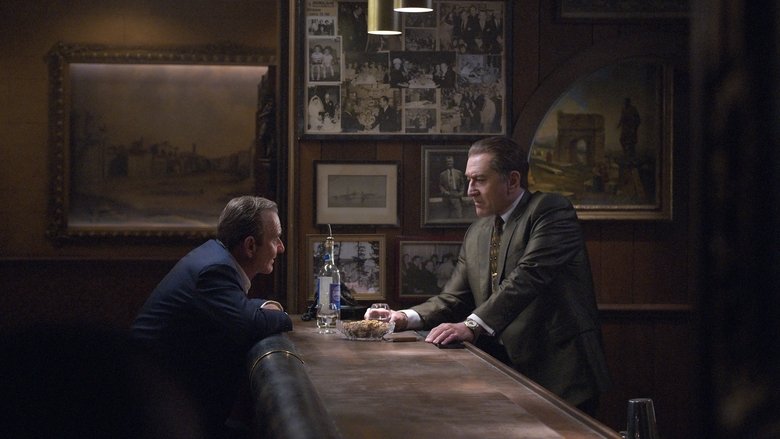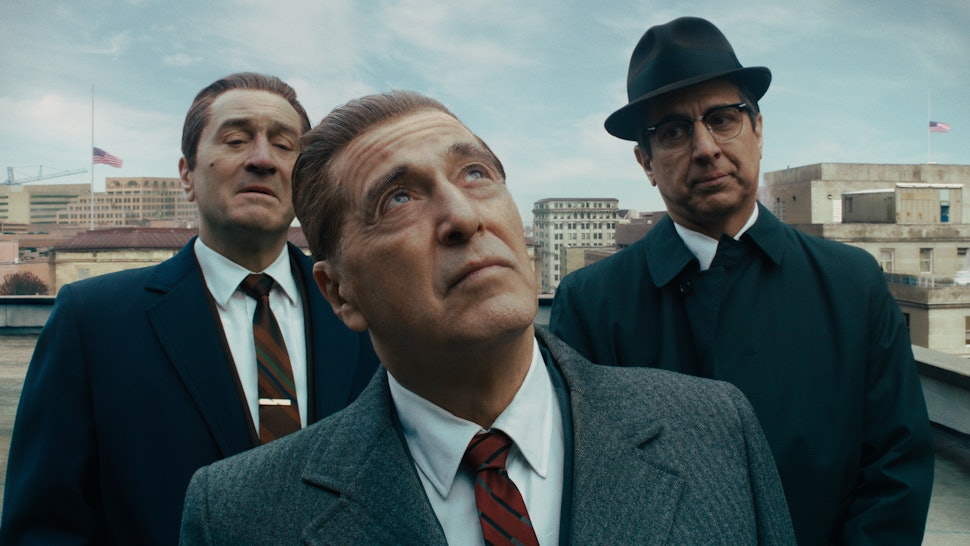← Back to Reviews

in
The Irishman
The screenplay definitely could have been a little more economic and some of the actors are getting a little too old for this kind of story, but Oscar winner cinematic storyteller Martin Scorsese proves he still has the ability to deliver a dark and sweeping fact-based mob epic with 2019's The Irishman, a compelling and often riveting film experience that delivers the goods even if it takes too long to do so.

The film is about a former military veteran named Frank Sheeran who finds himself working as a professional hitman for a powerful godfather named Russell Bufalino, who is tight with infamous union organizer Jimmy Hoffa. The film chronicles Russell's arranging for Frank to work for Hoffa and Frank's possible involvement in Hoffa's 1975 disappearance.

Steven Zaillian, who won an Oscar for the screenplay for Schindler's List has taken on an equally mammoth project here in this fact-based epic involving factual events and some characters that it's hard to know whether or not they were real, but has broken this story down into such intimate detail that, at times, it is difficult to remain invested in the story being presented, but Scorsese's style behind the camera and his unapologetic, in-your-face look at mob violence makes it really hard to turn away from the screen for a second out of fear of missing something very cool. Not even in Scorsese's masterpiece, Goodfellas, do I recall seeing so many people walking up to people right on the street and shooting them between the eyes. The violence in Joker was nothing compared to the violence in this film. Yet Scorsese also manages to squeeze in a lovely subplot about the gulf between Frank and his daughter, Peggy, who hates what her father does.

The primary selling point of this epic is the Master, Scorsese, and his seemingly unlimited storytelling tools and how he manages to vary them from project to project, always to maximum effect. His use of slow motion and the tracking shot are unparalleled here. I also love his ability to document the time onscreen, whether it is through archival news footage or through brief glimpses of movie marquees in certain scenes. Loved the shots of marquees of theaters showing The Three Faces of Eve and The Shootist, quietly documenting what year it was when these scenes took place.

The traditional Scorsese rep company was on hand here, though a lot of these actors are getting a little too old to be convincing in the beginning of these stories but they really shine in the end. De Niro does his patented wiseguy turn, but the real flash here comes from Al Pacino, chewing up the scenery as Jimmy Hoffa, and especially Joe Pesci, who could win his second Oscar after a 30 year gap for his masterfully underplayed performance as Russell Bufalino that commanded the screen. Of course, Thelma Schoonmaker's editing is Oscar worthy and a big thumbs up to Robbie Robertson's music but this is film is primarily a testament to Scorsese, who despite a little self-indulgence, still knows how to bring the goods.
The screenplay definitely could have been a little more economic and some of the actors are getting a little too old for this kind of story, but Oscar winner cinematic storyteller Martin Scorsese proves he still has the ability to deliver a dark and sweeping fact-based mob epic with 2019's The Irishman, a compelling and often riveting film experience that delivers the goods even if it takes too long to do so.

The film is about a former military veteran named Frank Sheeran who finds himself working as a professional hitman for a powerful godfather named Russell Bufalino, who is tight with infamous union organizer Jimmy Hoffa. The film chronicles Russell's arranging for Frank to work for Hoffa and Frank's possible involvement in Hoffa's 1975 disappearance.

Steven Zaillian, who won an Oscar for the screenplay for Schindler's List has taken on an equally mammoth project here in this fact-based epic involving factual events and some characters that it's hard to know whether or not they were real, but has broken this story down into such intimate detail that, at times, it is difficult to remain invested in the story being presented, but Scorsese's style behind the camera and his unapologetic, in-your-face look at mob violence makes it really hard to turn away from the screen for a second out of fear of missing something very cool. Not even in Scorsese's masterpiece, Goodfellas, do I recall seeing so many people walking up to people right on the street and shooting them between the eyes. The violence in Joker was nothing compared to the violence in this film. Yet Scorsese also manages to squeeze in a lovely subplot about the gulf between Frank and his daughter, Peggy, who hates what her father does.

The primary selling point of this epic is the Master, Scorsese, and his seemingly unlimited storytelling tools and how he manages to vary them from project to project, always to maximum effect. His use of slow motion and the tracking shot are unparalleled here. I also love his ability to document the time onscreen, whether it is through archival news footage or through brief glimpses of movie marquees in certain scenes. Loved the shots of marquees of theaters showing The Three Faces of Eve and The Shootist, quietly documenting what year it was when these scenes took place.

The traditional Scorsese rep company was on hand here, though a lot of these actors are getting a little too old to be convincing in the beginning of these stories but they really shine in the end. De Niro does his patented wiseguy turn, but the real flash here comes from Al Pacino, chewing up the scenery as Jimmy Hoffa, and especially Joe Pesci, who could win his second Oscar after a 30 year gap for his masterfully underplayed performance as Russell Bufalino that commanded the screen. Of course, Thelma Schoonmaker's editing is Oscar worthy and a big thumbs up to Robbie Robertson's music but this is film is primarily a testament to Scorsese, who despite a little self-indulgence, still knows how to bring the goods.
